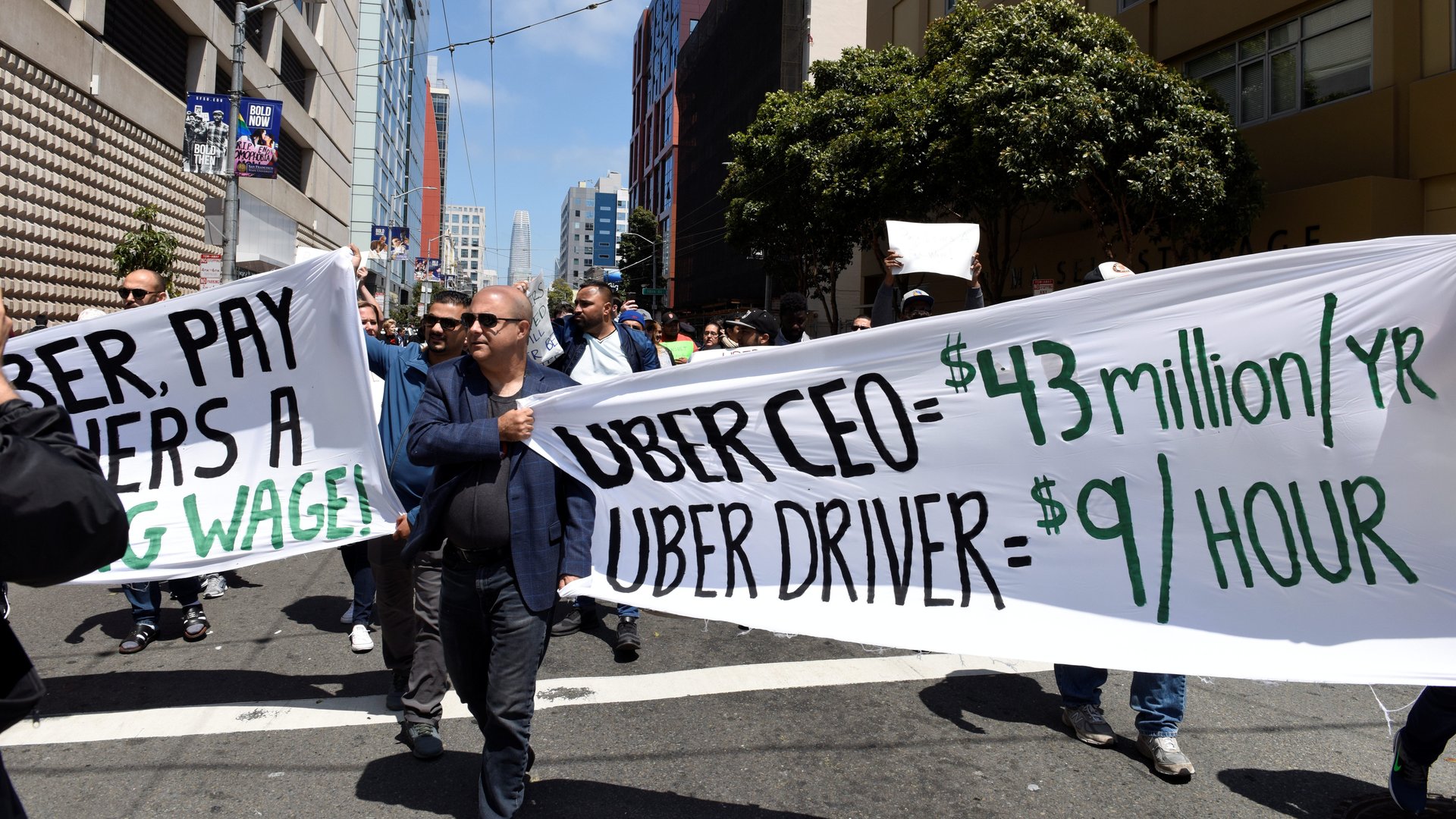The California Senate has voted to end the gig economy as we know it
Late on Tuesday local time (Sept. 10), the California Senate passed Assembly Bill 5 in a vote that will dramatically alter the course of the so-called gig economy.


Late on Tuesday local time (Sept. 10), the California Senate passed Assembly Bill 5 in a vote that will dramatically alter the course of the so-called gig economy.
The bill will likely reclassify hundreds of thousands of independent contractors as employees, arguably the most significant piece of legislation ever for companies like Uber and Lyft. It passed the Senate by a vote of 29-11 along party lines and must now pass a final vote by the State Assembly to approve amendments. Assuming it survives (a near certainty), AB5 will require the signature of California governor Gavin Newsom, who publicly backed it on Labor Day (Sept. 2). If approved, the legislation would take effect Jan. 1, 2020.
“The State Senate made it clear: your business cannot game the system by misclassifying its workers,” assemblywoman Lorena Gonzalez, the Democrat who authored the bill, said in a statement. “As lawmakers, we will not in good conscience allow free-riding businesses to continue to pass their own business costs onto taxpayers and workers. It’s our job to look out for working men and women, not Wall Street and their get-rich-quick IPOs.”
The gig economy has always depended on a simple gamble and arbitrage: Hire workers as contractors to do jobs through a platform, thereby eliminating the costs associated with traditional employment. With the passage of AB5, companies like Uber and Lyft that are already hemorrhaging money will likely be required to pay millions more in payroll taxes, workers’ compensation, and training costs for employees, not to mention higher wages once workers are protected by minimum wage laws ($12 an hour in California and $15 an hour in some cities, including San Francisco).
Analysts estimate AB5 will cost Uber and Lyft a combined $800 million per year. Both companies are trading well below their IPO share prices, and are under pressure from investors to get their spending under control. Uber reported a $5.2 billion loss for the second quarter and has launched an internal cost-cutting campaign encouraging employees to #FindTheMoney. The ride-hail company laid off 400 employees from its global marketing team in July and axed another 435 workers yesterday, hours before AB5 passed, including 8% of its engineering and product staff.
While the app-based gig economy has received most of the attention, AB5 could also impact those in other lines of work. Last week, for instance, independent truckers protested the bill outside the California State Capitol. Analysts have also warned about added costs to franchise restaurants that they believe could face more lawsuits under the new legislation. In May, AB5 was amended to exempt certain professions, including doctors, insurance agents, securities brokers, accountants, barbers, and hairstylists.
Uber and its peers in the gig economy fought hard to prevent AB5 from being passed. Uber and Lyft paid drivers to protest AB5, and encouraged them to contact their legislators to oppose the bill. Late last month, the ride-hail companies and food-delivery firm DoorDash committed $90 million to a 2020 ballot initiative designed to exempt themselves from the legislation and preserve the independent-contractor status of their workers.
“Our state’s political leadership missed an important opportunity to support the overwhelming majority of rideshare drivers who want a thoughtful solution that balances flexibility with an earnings standard and benefits,” Lyft spokesman Adrian Durbin said in an emailed statement. “The fact that there were more than 50 industries carved out of AB5 is very telling. We are fully prepared to take this issue to the voters of California to preserve the freedom and access drivers and riders want and need.”
The longer-term threat from AB5 is that California inspires other states to pass similar legislation, until the gig model is unwound on a national scale. Analysts at Morgan Stanley estimate global ride-hail bookings could fall by 5% to 9% if something like AB5 were adopted across the US. Analysts at investment firm Cowen last week described California as a “policy Petri dish” for other blue states and said they expected states like New York, New Jersey, Washington, Oregon, and Illinois to follow its lead.
In other words: AB5 passing is a nightmare scenario for the gig economy not just because of its immediate consequences, but because it proves that such legislation is possible and politically viable. Even if a company-sponsored ballot initiative to keep drivers classified as contractors prevails in 2020—and that’s a big if—California will still have given other states a roadmap to reining in the gig economy, which is something no amount of lobbying can undo.
This story was updated to include additional information from Lyft.